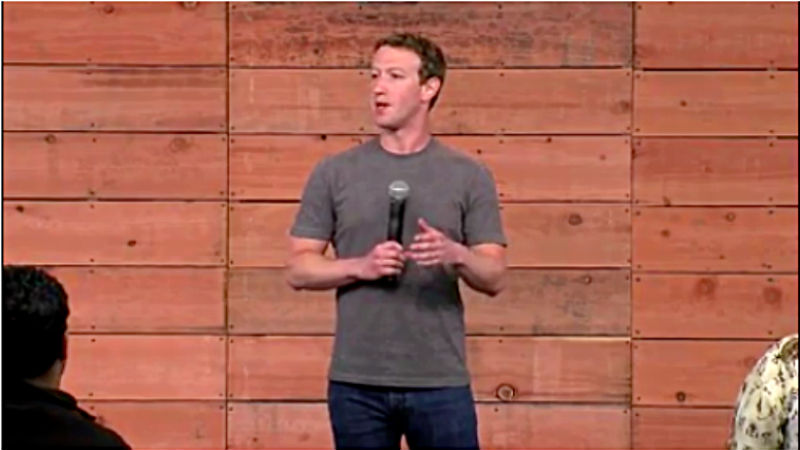
Facebook's founder Mark Zuckerberg during his live Q&A. Screenshot from Facebook.
Mark Zuckerberg has addressed the appeals of Ukrainian Facebook users for better content moderation and calls to create a dedicated Ukrainian office. His answer? Facebook “might consider” opening an office in Ukraine some time “in the future.”
Earlier this week, numerous users in Ukraine complained of their posts and accounts being taken down or blocked without any discernible violations of Facebook's community guidelines. They claimed these takedowns were politically motivated and the posts were being reported for violations by masses of “Kremlin supporters.” A mass appeal to Zuckerberg even garnered the support of Ukraine's President, Petro Poroshenko, who publicly joined the calls for a Ukrainian Facebook office.
In a Townhall Q&A with the Facebook founder, livestreamed online, Ukraine was the top item on the agenda, with the initial appeal to Zuckerberg gathering 45,000 likes—a record for the Townhall, according to the event moderator. Support for the issue from Poroshenko also got a mention.
Zuckerberg said he “did some research” ahead of the Q&A to “make sure he had the right answer” to Ukrainian complaints. Besides the creation of a Ukrainian HQ, he also addressed the content takedowns and unfair moderation practices that users claimed were “politically motivated.”
Zuckerberg said some of the Ukrainian posts in question did contain content that violated Facebook's community standards, namely the rule against “hate speech,” though he did not give specific examples.
We don't allow content that is overtly hateful, contains ethnic slurs, or incites violence. There were a few posts that tripped that rule, and I think we did the right thing according to our policies by taking down that content.
Acknowledging the ongoing conflict between Russia and Ukraine, Facebook's founder also addressed the “meme” perpetuated by many Ukrainian users that the content of the Ukrainian segment was moderated from a Russian office by “Russians who were anti-Ukrainian.” He reiterated what other Facebook representatives had previously confirmed: that Facebook has no Russian office, and that the reported content for the Ukrainian segment is reviewed by an international team speaking different languages based in the Dublin office.
Zuckerberg admitted to the Facebook team making one mistake when reported content from Ukrainians was being taken down.
We did make one mistake. When we reached out to people to tell them why we took stuff down, there was a bug in the software: the reason [for blocking] content was given as ‘nudity’ instead of ‘hate speech.'[…] But we fixed that and apologized. And we'll try not do this again.
Zuckerberg then addressed the question of a dedicated Ukrainian office, which many Ukrainians believe would help mitigate unfair blocking. His response, though, was rather vague.
Are we willing to put an office in Ukraine? Over time, it's something we might consider in the future. There are advantages to people working for Facebook not spread out around the world, but in a smaller number of offices. it makes sense to have local teams for sales, marketing, but for engineering and things like that it makes sense to centralize. But as we look to expand over time, we will, of course, consider all of these countries.
These answers are unlikely to satisfy Ukrainian Facebook users, many of whom have come to view Facebook as “a platform where truth can be sought for and found, thoughts shared and discussed and many moves of civil society coordinated.” While they address some of the issues, like why some of the posts were taken down for nudity when they didn't contain any, they fail to explain why content like this photo of a late Ukrainian soldier's daughter or a portrait and a quote from a classical Ukrainian poet were taken down (they hardly qualify as hate speech). Ukrainian Facebook community, it seems, will have to fight harder for their right to free expression and might have to continue their demands for more granular and more sensitive content moderation.



